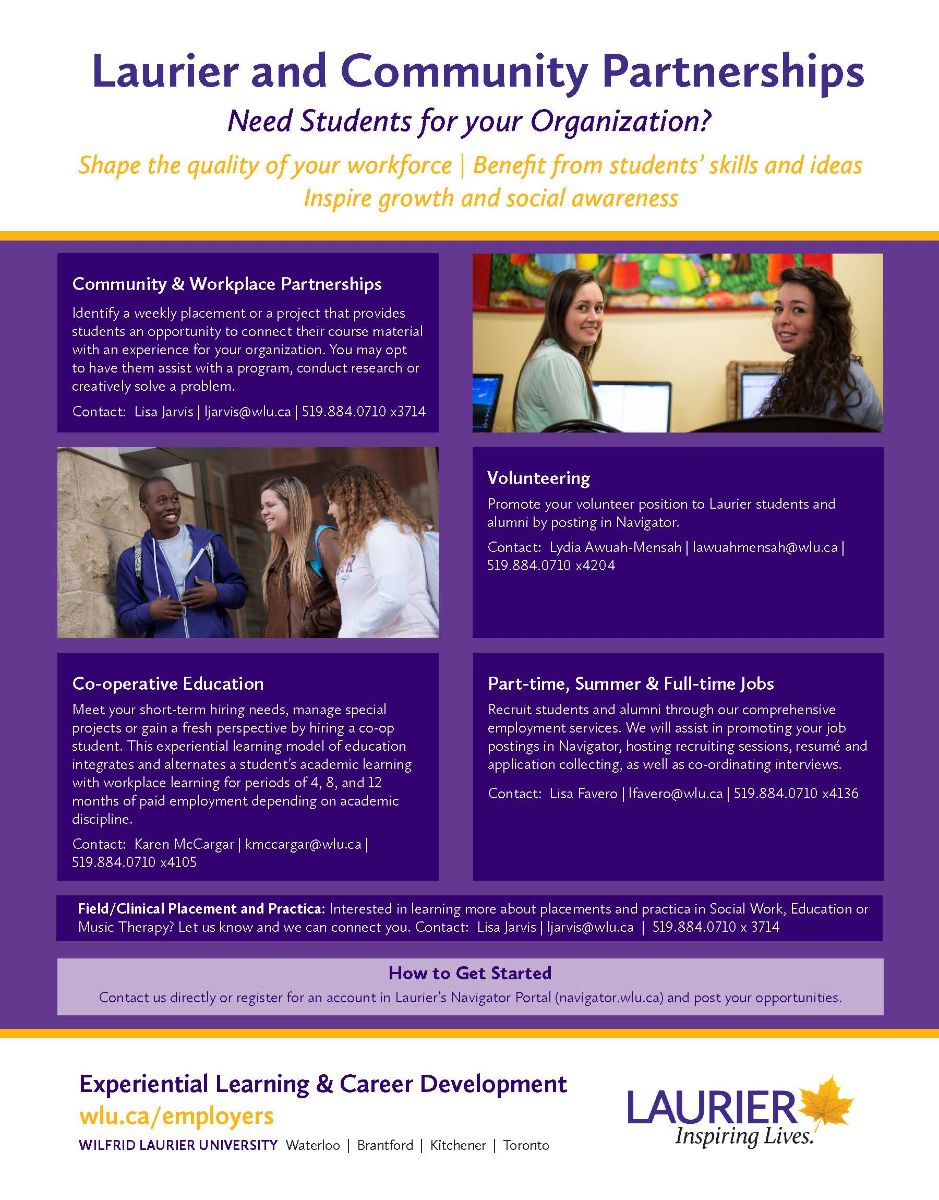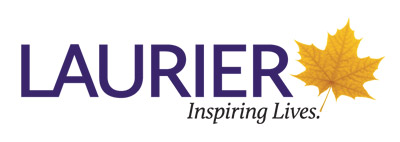Engaging with Employers
This section describes Laurier's approach to, and guiding principles of community engagement.
One of Laurier's distinguishing qualities is its long standing history of community engagement, both curricular and co-curricular. Laurier has a number of student clubs that engage in community work, professors who are involved in community-based research, organizations which post volunteer opportunities through Navigator and engagement opportunities within the non-profit sector that are embedded in courses. Laurier has responded to the community by creating a structure within experiential learning to better co-ordinate efforts for both outreach and response to employers.
Experiential Learning Inventory: By conducting an institution-wide EL Inventory (which involves auditing the syllabi of every course, and communicating with all departments and student associations), Laurier is able to identify all involvement with community. Further, this inventory allows Laurier to monitor which community partners are perhaps being 'over taxed' and to create campus partnerships among stakeholders who are involved in similar work.
Streamlining Communication/One stop shop: Laurier has recently made strides in streamlining communication with community employers. This has been achieved through the establishment of the unit of Experiential Learning & Career Development in the Spring 2017.
Further, Laurier uses one common database, Navigator, to track all contacts with the community, which is useful for gaining a comprehensive understanding of relationships that exist with community partners.
Finally, Laurier has developed a 'one stop shop' approach, providing employers with access to information on all experiential learning and recruitment services through one unit, and a point of contact for referrals elsewhere within the organization.
Principles of Curricular Community Engagement
The following principles speak to best practices at Laurier in curricular engagement. Laurier's commitment to these principles has helped the institution to build a foundation of positive and sustainable community partnerships:Communication: Laurier communicates with community partners at the beginning, mid-point and conclusion of all student placements. Students report their hours and activities weekly using Navigator and employers approve those hours. Laurier ensures that employers are aware of the expectations, terms and conditions of the placement and that partners know what to do if they have a concern or want to provide feedback in between standard check-ins.
Commitment: When making commitments to employers, Laurier ensures that they are realistic, achievable and carried out to completion. For example, Laurier does not promise employers that their Community Service-Learning (CSL) opportunities will be filled. Rather, employers are informed that opportunities are matched with a course that is relevant and in the event that a community opportunity goes unfilled, employers are welcome to post the volunteer opportunity in Laurier's Navigator database.
Clarifying Roles and Responsibilities: Developing Memoranda of Understanding which clearly outline what each stakeholder in the EL relationship will perform or deliver helps with building clear channels of communication, identifying potential issues at the onset and ensuring that both students and employers are capable of carrying out the partnership to completion.
Further, while students offer a wealth of benefits to community organizations, it is important that employers remember that they are still there to learn, and cannot be expected to perform to the same expectations as a professional consultant. It is also important to clarify and manage expectations around the number of hours to which a student can commit, the degree of supervision expected of employers and the learning goals that students expect to fulfill throughout their placements.
Sustainability: Laurier considers whether the scope of a project (e.g., number of students involved, amount of supervision required, community capacity, etc.) is sustainable in the long run. Accordingly, it is good practice to start with small and focussed projects and then consider opportunities for growth.
Reciprocity: Experiential Learning partnerships should benefit all stakeholders - the institution, students and employers. While there are certainly a number of ways that students benefit the community (e.g., contributing to research, providing a fresh perspective on issues, keeping theory alive in the workplace and preparing to meet the sector's future human capital needs), there are also ways that experiential learning can cause a strain on the sector (e.g., the effort involved in onboarding and supervising students and the multitude of contacts and inquiries that the sector must respond to in an ongoing way). It is important that the institution think about the value it brings to employers, as well as ways of simplifying communication with employers.
Risk Management
Laurier's Experiential Learning programs work with the Safety, Health, Environment, and Risk Management (SHERM) department within the institution to determine the appropriate forms and processes for all student curricular off-campus engagement. Employers are often concerned about WSIB and Laurier provides the forms needed for unpaid placements, outlining how students are covered through the university and/or through the Ministry. Students also complete a declaration regarding insurance coverage for unpaid placements.For all new partners, Laurier carries out a due diligence (safety) checklist and encourages employers to provide orientation and training to students, just as they would to any new employee of the organization.
Students are made aware of any pre-placement requirements, such as immunizations or police checks two to three months in advance, along with the length of validity that employers require (e.g., a police check obtained for other purposes may still be considered valid if obtained within a specified time frame) and any additional Health and Safety training the employer may require. For more information on pre-placement screening for Community Service-Learning, click here.
When students are engaging with an employer outside of an approved curricular program, liability coverage is the responsibility of the employer, just as it is with any other volunteer of the organization.
Other Engagement Strategies
 Develop user-friendly print materials for employers: Laurier has developed a one-page flyer available electronically and in print for employers which describes the various partnerships and respective contacts for student experiential learning and recruitment. This helps employers to understand the options available to them and can be distributed in person at networking events, or as an email attachment.
Develop user-friendly print materials for employers: Laurier has developed a one-page flyer available electronically and in print for employers which describes the various partnerships and respective contacts for student experiential learning and recruitment. This helps employers to understand the options available to them and can be distributed in person at networking events, or as an email attachment.Co-create and deliver the curriculum with the community partner: Laurier's Community Engagement Option is an exemplar of embeddedness and reciprocal community partnership. Rather than soliciting employers with the aim of fulfilling certain experiences that students need, this model is about listening to community and asking how students and faculty could help to address the issues that exist, and finding ways to facilitate those learnings within the curriculum. It allows the community to identify and recommend student engagement opportunities.
Foster a relationship with your local Volunteer Network: Laurier has long standing relationships with both The Volunteer Action Centre of Waterloo Region, and BRAVA (Brant Region Association of Volunteer Administrators). Engaging in these associations helps Laurier to stay current on issues, changes and opportunities within the non-profit sector and also provides a platform for marketing and employer engagement.
Initiate in-person visits with employers: One of Laurier's areas of strength in community engagement frequently noted by employers is the personal attention provided by Laurier's staff. One employer expressed that he found it difficult to find the time to respond to emails from institutions. His organization had so many 'unknowns' when it came to setting up an experiential learning placement that he had been procrastinating in following up. When Laurier's Community Service-Learning Co-ordinator arranged an in-person visit, took a tour of the organization and offered practical advice about ways in which this employer could engage with Laurier, the employer was compelled to action.
Facebook Page: Laurier's Community Service-Learning department has a Facebook page, used to keep partners informed and share stories in an easy and accessible way.
Volunteer in the community as representatives of the institution: Laurier's Career Development Centre participated in a group volunteer experience, delivering food hampers over the holidays for a community organization. Not only was this an excellent team-building experience for staff which promoted experiential learning from within, it also helped to demonstrate reciprocity to a long-standing community partner organization of Laurier.
Host Community Fairs: As a service offered to employers, Laurier hosts community fairs which allow employers to recruit more broadly for other needs that they might have which do not fall within the parameters of curricular experiential learning. This benefits employers, as well as students who are not involved in Co-op or Community Service-Learning but still wish to participate in a community experience.
Navigator: Employers are provided with free access to Laurier's Navigator database to post volunteer or paid employment opportunities exclusively for students and alumni. After creating an account, employers are able to upload their own postings. Employers are also able to feed their postings into Laurier's Navigator database via the Volunteer Action Centre website, which saves time by avoiding the need to enter postings in both databases.
